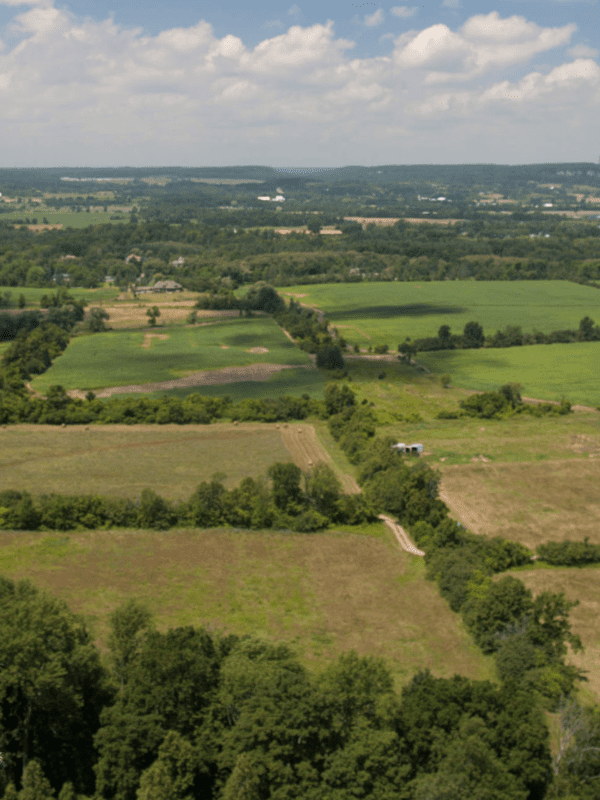ENVIRONMENTAL DEFENCE AND ECOJUSTICE
The federal government must urgently update the Impact Assessment Act and include the 413 project
Toronto | Traditional territories of the Mississaugas of the Credit, the Anishinaabeg, the Haudenosaunee, and the Wendat – Yesterday, a joint application by the federal and provincial governments was submitted to the Federal Court to cancel the current federal environmental assessment for the proposed Highway 413 (letter and draft order). The federal withdrawal takes place within Ontario’s ongoing case against the designation. The federal government has done this even though it has not yet put in place a revised law or committed to a new designation, representing a gross abandonment of federal responsibility to protect the people of Ontario and an acceleration of ongoing attacks on our shared future by the provincial government.
Ontario cannot go ahead with the project without seeking other federal approvals for harm to federally protected wildlife. The federal government must not abandon its responsibility to protect this wildlife in the interim period before a new Act is in place. The federal government should commit to re-designating Highway 413 under the new Act.
The decision of the federal government to withdraw from the case brought by Ontario against the designation of Highway 413 without a hearing means that arguments about the legality of the order Ontario seeks, and the environmental impacts it would cause will likely not be heard. The federal government could have continued to protect those interests through the court process but chose not to. Environmental Defence, as represented by counsel from Ecojustice, is an intervenor in this legal case.
“Highway 413 is the bulldozer front of farm-eating, nature-killing, climate-warming, developer-enriching sprawl that would cost Ontarians billions. Much better city-building and transportation alternatives are at our fingertips,” said Tim Gray, Executive Director, Environmental Defence.
“The federal government needs to urgently introduce legislation that updates the Impact Assessment Act and that re-designates the Highway 413 project under it. Revoking the designation before a new Impact Assessment Act is in place was irresponsible and unnecessary,” said Laura Bowman, Staff Lawyer, Ecojustice.
At a time when the provincial government has gutted all meaningful consideration of environmental, social and economic values in decision-making, Ontarians have no choice but to rely on the federal government for protection. Failing to designate the 413 project for a federal Impact Assessment would be a betrayal of what the federal government has said it stands for with regard to climate, housing and the environment. It would mean undermining the Golden Horseshoe’s emission reduction progress by locking in decades of car-dependent sprawl. It would enable expensive, low-density and transit-hostile development at a time when we need more accessible and affordable homes built within towns and cities. It would also breach federal obligations to protect waterways, Indigenous sites, and at-risk migratory birds and fish.
“Just as the provincial government’s attack on the broader Greenbelt was never about building housing, the proposed Highway 413 is not about addressing traffic congestion. It is simply a $10 billion tax-payer subsidy for the sprawl schemes of well-connected developers,” said Gray.
“It is essential that the federal government fully uses its powers to protect Indigenous rights, fish, migratory birds and species at risk under other legislation now that the designation will be revoked. The federal government will be held accountable if it does not enforce its laws,” added Bowman.
Opposition to Highway 413 stems from Ontarians recognizing that unrestricted expansion of urban sprawl into the countryside is a major environmental threat. The people of Ontario will have the final say on governments who continue to pursue reckless, unplanned and destructive development like Highway 413. Both the federal and provincial governments will be held accountable by them.
Background Information
There are multiple ways that building Highway 413 would threaten people in Ontario and infringe on areas of federal government responsibility:
- Highway 413 would cause over 17 million tonnes of additional CO2 emissions by 2050 – the same date by which Canada is committed to reach net-zero emissions.
- The highway would enable and encourage expensive sprawl and make impossible the development of Brampton’s Heritage Heights, a transit-oriented, more affordable community.
- Highway 413 would pave over 400 acres of the Greenbelt, and over 2,000 acres of Class 1 and Class 2 farmland – Ontario’s most productive farmland.
- Highway 413 would cross over 85 rivers and streams, require a massive bridge over the Humber River and would pollute and destroy fish habitat.
- The highway would cause real and unavoidable harm to a range of at-risk and endangered species by destroying their rare habitats.
- Highway 413 would save drivers less than 1 minute on average across the region, and not the 30 minutes that the Ontario government is claiming.
- Highway 413 would be built only 15 km north of the underused Highway 407, which is owned by the Canada Pension Plan Investment Board.
- The highway would cost taxpayers billions. Although the Ontario Ministry of Transportation (MTO) has failed to release updated cost estimates, by 2021, the cost was already estimated upwards of $10 billion.
- Highway 413 could destroy important archaeological sites as the project passes through land that has long been inhabited by the Wendat. The highway would also bisect the sensitive headwaters of four watersheds within Mississauga of the Credit First Nation’s territory and impact their physical and cultural heritage, including ceremonial sites, burial sites and the cultural landscape.
- Analysis by transportation experts Eunomia Research shows that moving trucks from Highway 401 to the 407 will alleviate congestion for all road users and reduce journey times for truck drivers, save taxpayers at least $6 billion and protect valuable natural spaces including 2000 acres of farmland and 400 acres of Greenbelt.
ABOUT ENVIRONMENTAL DEFENCE (environmentaldefence.ca): Environmental Defence is a leading Canadian environmental advocacy organization that works with government, industry and individuals to defend clean water, a safe climate and healthy communities.
ABOUT ECOJUSTICE (ecojustice.ca): Ecojustice uses the power of the law to defend nature, combat climate change, and fight for a healthy environment. Its strategic, public interest lawsuits and advocacy lead to precedent-setting court decisions and law and policy that deliver lasting solutions to Canada’s most urgent environmental problems. As Canada’s largest environmental law charity, Ecojustice operates offices in Vancouver, Calgary, Toronto, Ottawa, and Halifax.
– 30 –
For more information or to request an interview, please contact:
Carolyn Townend, Environmental Defence, media@environmentaldefence.ca
Shayo Mehta, Ecojustice, smehta@ecojustice.ca






